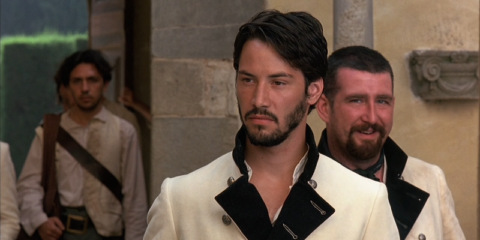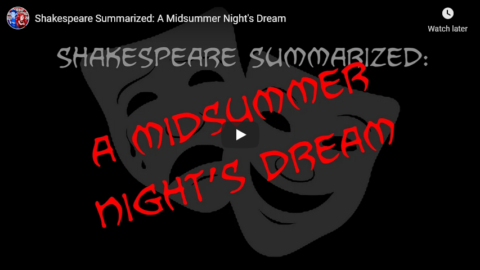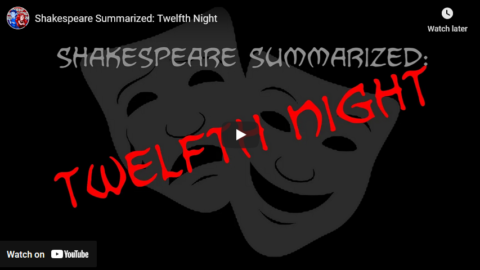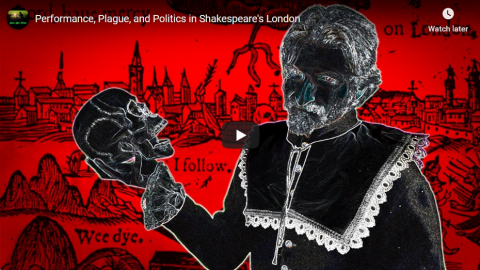Professor of Rock
Published 8 Apr 2022One of the most heart wrenching love songs of the 80s steeped in a happy go lucky feel. “Romeo and Juliet” by Dire Straits is a bit of conundrum. Find out what this riddle of a song means from their 1980 classic album Making Movies and how Mark Knopfler took a breakup and made it an all-time standard next on Professor of Rock.
Hey music junkies and vinyl junkies Professor of Rock always here to celebrate the greatest artists and the greatest 80s songs of all time for the music community and vinyl community with music history video essay’s including today’s Dire Straits story of “Romeo and Juliet” and Dire Straits reaction. If you’ve ever owned records, cassettes and CD’s at different times in your life or still do this is your place. Subscribe below right now to be a part of our daily celebration of the rock era with exclusive stories from straight from the artists and click on our Patreon link in the description to become an Honorary Producer.
The British rock band Dire Straits formed in London in 1977. Their original line-up consisted of Mark Knopfler on lead vocals and lead guitar, his brother David on rhythm guitar, John Illsley on bass and Pick Withers on drums. In 1978 they released their self-titled debut which included the singles “Water of Love” and “Sultans of Swing”.
In 1979, they released their follow-up Communique, putting out the singles “Lady Writer” and “Once Upon a Time in the West”. For their third album, Dire Straits traveled to New York, and set up shop at a studio called the Power Station. They got to work on June 20, 1980. The album, called Making Movies was co-produced by Mark Knopfler and Jimmy Iovine, who had been the engineer and mixer on Bruce Springsteen’s Born to Run. Due to this connection, Iovine was able to secure E Street Band keyboardist Roy Bittan for the sessions.
It was the first time the band had ever fully worked a keyboardist into its lineup, but Knopfler’s arrangements were expanding musically and getting more complex. And Bittan was just the man for the job. Going into the studio, Mark had written a lineup of several great songs, “Tunnel of Love”, “Skateaway”, “Expresso Love”, “Romeo and Juliet” … And there was a sense within the group that this album was going to be something very special.
But for all the promise on the horizon, Dire Straits’ increasing success had exhausted one of its members. Dave Knopfler, more than anyone else in the band was struggling. And if the intense march to fame and fortune wasn’t hard enough, Dave also had the distinct challenge of living in shadow of his brother Mark … who was the undisputed leader of the band.
Through the first few weeks of recording Dave’s dissatisfaction felt like a dark cloud. And it followed him wherever he went. With eyes averted to the floor, he and Mark had all but stopped talking. And the resentment and gloom were dragging everyone down. It all came to a head one day when Dave showed up to the studio empty-handed. Responsible for a fairly simple guitar part on “Romeo & Juliet”, Dave just hadn’t bothered to practice it. So, Iovine told him to go away and learn it.
(more…)
August 27, 2022
Ex Dissed Him Publicly … Turned BRUTAL Insult Into An 80s Classic | Professor of Rock
August 9, 2022
QotD: Fusty old literary archaism
For as long as I can remember, readers have been trained to associate literary archaism with the stuffy and Victorian. Shielded thus, they may not realize that they are learning to avoid a whole dimension of poetry and play in language. Poets, and all other imaginative writers, have been consciously employing archaisms in English, and I should think all other languages, going back at least to Hesiod and Homer. The King James Version was loaded with archaisms, even for its day; Shakespeare uses them not only evocatively in his Histories, but everywhere for colour, and in juxtaposition with his neologisms to increase the shock.
In fairy tales, this “once upon a time” has always delighted children. Novelists, and especially historical novelists, need archaic means to apprise readers of location, in their passage-making through time. Archaisms may paradoxically subvert anachronism, by constantly yet subtly reminding the reader that he is a long way from home.
Get over this adolescent prejudice against archaism, and an ocean of literary experience opens to you. Among other things, you will learn to distinguish one kind of archaism from another, as one kind of sea from another should be recognized by a yachtsman.
But more: a particular style of language is among the means by which an accomplished novelist breaks the reader in. There are many other ways: for instance by showering us with proper nouns through the opening pages, to slow us down, and make us work on the family trees, or mentally squint over local geography. I would almost say that the first thirty pages of any good novel will be devoted to shaking off unwanted readers; or if they continue, beating them into shape. We are on a voyage, and the sooner the passengers get their sea legs, the better life will be all round.
David Warren, “Kristin Lavransdatter”, Essays in Idleness, 2019-03-21.
July 25, 2022
“Yond Cassius has a lean and hungry look; He thinks too much: such men are dangerous“
Rob Henderson considers the character of Julius Caesar (as filtered through Plutach and Shakespeare), and the “Dominance-Oriented Status Seekers” identified in a recent paper:
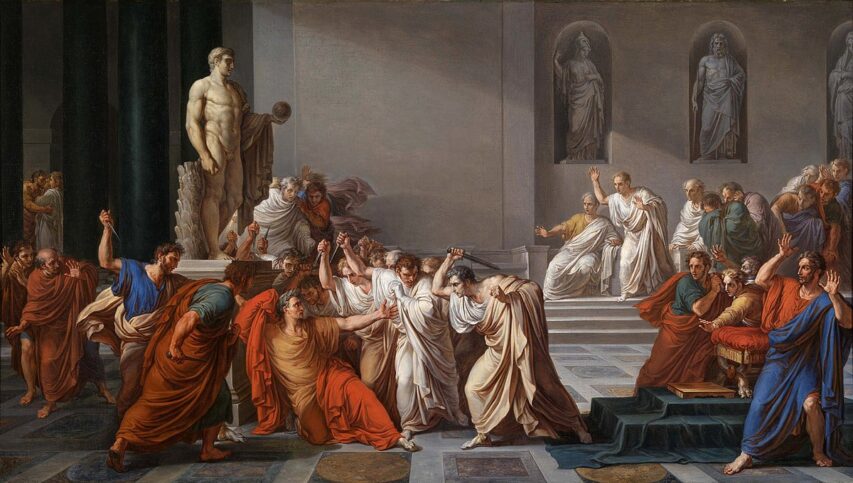
La morte di Cesare (The death of Caesar)
Oil painting by Vincenzo Camuccini between 1804 and 1805. via Wikimedia Commons.
In the opening scene of Shakespeare’s Julius Caesar (which is drawn from Plutarch’s Lives), the commoners of Rome are seen celebrating Caesar’s recent triumph over Pompey.
Two tribunes (elected officials), Flavius and Marullus, accost two of the commoners, asking them to name their trades and explain why they are out in their best attire rather than working.
The commoners respond to the tribunes’ condescension with indirect answers and puns that annoy the tribunes even more.
Eventually, Flavius and Marullus learn that the plebeians are cheering Caesar. The tribunes scorn them for doing this.
They tell the commoners that Pompey was a Roman too. So Caesar’s success was not truly a triumph for Rome.
Flavius later tells Marullus that they should remove the decorations from Caesar’s statues during Caesar’s parade.
Marullus questions this plan, stating that it also happens to be the Feast of Lupercal, a celebration of fertility.
But Flavius is adamant that they remove the ornaments, because the removal will help prevent Caesar from seeing himself as too great.
This first scene of Julius Caesar shows that the tribunes want to prevent the rise of a potential tyrant. But they themselves are more than willing to push the commoners around.
Later, two other prominent Romans — Brutus and Cassius — are likewise shown expressing their concerns about Caesar’s growing popularity.
Cassius asks Brutus how Caesar has any more right to greatness than Brutus or himself.
Cassius tells Brutus a story: When they were young, Cassius saved young Julius Caesar from drowning. Cassius always viewed himself as superior for rescuing Caesar. He is now aggravated that Caesar has risen above him.
Cassius decides to orchestrate Caesar’s assassination. Cassius gradually convinces other members of the Roman elite to help him carry out the conspiracy.
Meanwhile, Caesar himself, speaking privately with Mark Antony, expresses suspicions about Cassius:
CAESAR
Let me have men about me that are fat,
Sleek-headed men, and such as sleep a-nights.
Yond Cassius has a lean and hungry look.
He thinks too much. Such men are dangerous.
ANTONY
Fear him not, Caesar; he’s not dangerous.
He is a noble Roman, and well given.
CAESAR
Would he were fatter! But I fear him not.
Yet if my name were liable to fear,
I do not know the man I should avoid
So soon as that spare Cassius. He reads much,
He is a great observer, and he looks
Quite through the deeds of men. He loves no plays,
As thou dost, Antony; he hears no music;
Seldom he smiles, and smiles in such a sort
As if he mocked himself and scorned his spirit
That could be moved to smile at anything.
Such men as he be never at heart’s ease
Whiles they behold a greater than themselves,
And therefore are they very dangerous.
I rather tell thee what is to be feared
Than what I fear; for always I am Caesar.
Come on my right hand, for this ear is deaf,
And tell me truly what thou think’st of him.Caesar is saying all men are hungry, either for food, entertainment (“he loves no plays … he hears no music”), or power. If prosperous men aren’t tempted by food and entertainment, then they crave power. Thus, prosperous men who are lean are dangerous.
Mark Antony dismisses Caesar’s concerns about Cassius, because Cassius is a “noble Roman”. But as events unfold, we see that Antony was misguided.
Caesar was correct in his judgment of Cassius.
The eminent literary critic (and my former professor) Harold Bloom has stated that Caesar’s “estimate of Cassius shows him to be the best analyst of another human being in all of Shakespeare”.
Bloom goes on to characterize Cassius as embodying a “spirit of resentment, unhappy as he is at contemplating greatness beyond him”.
Cassius secretly arranges to have fake notes sent to Brutus, who is fooled into thinking the notes have been written by ordinary Roman citizens who want the Roman elites to stand up against Caesar.
When persuading the other conspirators to help him carry out the assassination plot, Cassius’s stresses his concern for the future of Rome.
But Cassius’s story to Brutus indicates that the assassination was in part fueled by his resentment that Caesar grew into someone more powerful than himself, thus upending their former status disparity.
Rowan Atkinson & Hugh Laurie – Shakespeare and Hamlet (1989)
Nathaniel Brechtmann
Published 1 Sep 2011A sketch called “A Small Rewrite”, performed by Hugh Laurie (aka House) as Shakespeare and Rowan Atkinson (aka Mr Bean) as the editor.
December 29, 2021
A history of and my first go at MEDIEVAL TENNIS
Lindybeige
Published 28 Sep 2021Thanks to Audible for sponsoring this video. New Audible members get a 30-day free trial. Visit http://audible.com/lindybeige or text “lindybeige” to 500 500 to try Audible today.
Tennis is a very old sport, going back at least to the 1200s. Here I try my hand at it for the very first (but not last) time, and talk about the history of it a bit.
Many thanks to Jesmond Dene Real Tennis Club (https://www.jdrtc.co.uk) where this was shot.
Editing this took a LONG time. We had three cameras recording at the same time, and synching the footage up took an age. The sound consisted mainly of echoing footsteps and ball bounces, and the fact that the main microphone kept glitching did not help (you will notice some of the patches to the sound using other mics, but most I made fairly smooth).
Court map by Atethnekos at English Wikipedia, CC BY-SA 3.0, https://commons.wikimedia.org/w/index…
Anne Boleyn picture by English school – https://thetudortravelguide.com/2019/…, Public Domain, https://commons.wikimedia.org/w/index…
Support me on Patreon: https://www.patreon.com/Lindybeige
Buy the music – the music played at the end of my videos is now available here: https://lindybeige.bandcamp.com/track…
Buy tat (merch):
https://outloudmerch.com/collections/…Lindybeige: a channel of archaeology, ancient and medieval warfare, rants, swing dance, travelogues, evolution, and whatever else occurs to me to make.
▼ Follow me…
Twitter: https://twitter.com/Lindybeige I may have some drivel to contribute to the Twittersphere, plus you get notice of uploads.
My website:
http://www.LloydianAspects.co.uk
November 3, 2021
QotD: English literature
Here one comes back to two English characteristics that I pointed out, seemingly rather at random, at the beginning of the last chapter. One is the lack of artistic ability. This is perhaps another way of saying that the English are outside the European culture. For there is one art in which they have shown plenty of talent, namely literature. But this is also the only art that cannot cross frontiers. Literature, especially poetry, and lyric poetry most of all, is a kind of family joke, with little or no value outside its own language-group. Except for Shakespeare, the best English poets are barely known in Europe, even as names. The only poets who are widely read are Byron, who is admired for the wrong reasons, and Oscar Wilde, who is pitied as a victim of English hypocrisy. And linked up with this, though not very obviously, is the lack of philosophical faculty, the absence in nearly all Englishmen of any need for an ordered system of thought or even for the use of logic.
George Orwell, “The Lion And The Unicorn: Socialism and the English Genius”, 1941-02-19.
June 14, 2021
Movies based on “classic literature”
Severian considers the relative glut of movies more-or-less based on the classics of literature from his formative years:
When I was a young buck, there was a fad for making movies out of “classic literature”. Scads of chick flicks, of course — Jane Austen’s complete works, the Brontës, and so on — but they also took a stab at Shakespeare. Mostly they stuck to the comedies — and trust me, watching Keanu Reeves trying to handle Much Ado About Nothing is hilarious, in all the wrong ways — but they’d occasionally give the tragedies a shot. Kenneth Branagh’s Hamlet is pretty good despite all the distracting cameos, his Othello is at least sincere (ye gods, imagine trying to make that today!), I think I’m forgetting a few. Mel Gibson gave Hamlet a go back in the early 1990s, and so on. Again, I’m pretty sure I’m forgetting a few.
It always struck me as odd. Unless they timed the theatrical releases to midterm and finals week, hoping to hoover up the dollars of desperate sophomores who didn’t do the homework, it didn’t make much sense, marketing-wise. We were a much more culturally literate people once, it’s true*, but there’s just not much of an audience for the Bard anymore. Nor was it a case of SJWs trying to destroy something good just on general principles. I’m sure Gwyneth Paltrow was bad as Emma, but the idea of retconning every single female in the Western Canon into a Strong, Confident Woman(TM) was still in its infancy. My only other guess was that, since college enrollments were skyrocketing, maybe the parents of all those first-gen college kids were feeling mal-educated and trying to catch up …? Lame, I know, but it was the best I could do.
Looking back on it now, I see my problem: I was looking at it from the demand side. Silly and naive as I was, I assumed that Hollywood’s primary concern was making money, so they went out and found what the people wanted to see, then gave it to them. For instance, I thought Titanic was going to be a huge flop. I mean, the boat sinks. We know that. How do you squeeze any dramatic tension out of it? I should’ve realized they’d be playing it as a doomed-lovers tragedy — girls love that shit, what with the big flouncy costumes and all. Once I realized that, I thought I had it all figured out — every girl I, personally, knew found the works of Jane Austen tedious, but that’s because (I reasoned) you have to supply the images for yourself. Put Hunky McBeef up there in breeches and a peruke, Waify Beecup in a Regency dress, and it’s chick crack …
Or so I thought. Looking back on it now, that’s as dumb as my opinion that Titanic would bomb. Hollywood doesn’t care what you want. I doubt if Hollywood has ever cared what you want, but if they ever did, that time probably ended in tandem with Clara Bow’s career. Hollywood wants what they want, and so will you, because whaddaya gonna do, not watch it? The reason they made all those “classic literature” films in the 1990s, then, wasn’t because they thought we wanted (or needed) some cultural uplift.
No, the reason was: By the 1990s, the last of the old guard in Hollywood was dying off, replaced by the new guard, the Baby Boomers. As we know, it’s not enough for Boomers to control everything while making a shitload of money. No no, for them everything has to be deep and meaningful. They thought of themselves as artistes, not entertainers, so they had to put out a bunch of highbrow stuff, and we had to watch it. This is the sole reason goofy-looking Kenneth Branagh and his horse-faced wife (at the time) were a big cultural force. They made Shakespeare sexy, by which I mean, they allowed the studio heads to think of themselves as the arbiters of culture, not the carny trash they were and are. That some decent movies got made because of it, is entirely incidental.**
*Last summer, during the worst of lockdown mania, I introduced my little nephews to Bugs Bunny. The real ones, from the 40s and 50s, not the crap they put out ten, twenty years ago. I am an educated man by modern standards, but a lot of that stuff flew over my head … and they used to show these in front of popular movies, on military bases, etc.! There’s the classic Wagner one, of course — kill da wabbit!! — but another one involves The Barber of Seville, which I haven’t seen performed and had to look up. Even the “throwaway” music was classical — they could assume, in other words, that your average workaday guy or GI had a fairly large repertoire of classical pieces in his head, enough to recognize bits from Strauss, Chopin, Schumann, etc.
**I do kinda regret bashing Sir Kenneth, as wiki tells me he now is. I enjoyed Hamlet (again, despite the annoying cameos), and some of his other work was pretty entertaining, even, in a limited way, visionary — a quirky little picture like Dead Again didn’t do much in 1991, but it would clean up now (a PoMo costume drama!). I’m one of the few people who liked Mary Shelley’s Frankenstein, which again despite terrible casting (Robert De Niro? Seriously?) was loads of fun. Shelley’s novel as written is ludicrous, therefore unfilmable, but Branagh admirably captured the spirit of it. It’s as Goth as can be, in the original sense of “Gothic”. Wonderful stuff.
April 16, 2021
“Students will find in Shakespeare absolutely no moral compass”
Sky Gilbert responds more than adequately to a demand to “Cancel Shakespeare” that also appeared in The Line recently:

This was long thought to be the only portrait of William Shakespeare that had any claim to have been painted from life, until another possible life portrait, the Cobbe portrait, was revealed in 2009. The portrait is known as the “Chandos portrait” after a previous owner, James Brydges, 1st Duke of Chandos. It was the first portrait to be acquired by the National Portrait Gallery in 1856. The artist may be by a painter called John Taylor who was an important member of the Painter-Stainers’ Company.
National Portrait Gallery image via Wikimedia Commons.
Allan thinks that Shakespeare’s language is difficult and old fashioned, and that students today find analyzing the complexities of his old-fashioned rhetoric boring and irrelevant. Yes, Shakespeare essentially writes in another language (early modern English). And reading or even viewing his work can be a tough slog. Not only did he invent at least 1,700 words (some of which are now forgotten today), he favoured a befuddling periodic syntax in which the subject does not appear until the end of a sentence.
But a study of Shakespeare’s rhetoric is important in 2021. There is one — and only one — exceedingly relevant idea that can be lifted from Shakespeare’s congested imagery, his complex, sometimes confusing metaphors — one jewel that can be dragged out of his ubiquitous references to OVID and Greek myth (references which were obviously effortless for him, but for most of us, only confound). And this idea is very relevant today. Especially in the era of “alternate facts” and “fake news.”
This idea is the only one Shakespeare undoubtedly believed. I say this because he returns to it over and over. Trevor McNeely articulated this notion clearly and succinctly when he said that Shakespeare was constantly warning us the human mind “can build a perfectly satisfactory reality on thin air, and never think to question it.” Shakespeare is always speaking — in one way or another — about his suspicion that the bewitching power of rhetoric — indeed the very beauty of poetry itself — is both enchanting and dangerous.
Shakespeare lived at the nexus of a culture war. The Western world was gradually rejecting the ancient rhetorical notion that “truth is anything I can persuade you to believe in poetry” for “truth is whatever can be proved best by logic and science.” Shakespeare was fully capable of persuading us of anything (he often does). But his habit is to subsequently go back and undo what he has just said. He does this so that we might learn to fundamentally question the manipulations of philosophy and rhetoric — to question what were his very own manipulations. Shakespeare loved the beautiful hypnotizing language of poetry, but was also painfully aware that it could be dangerous as hell.
In fact, Shakespeare’s work is very dangerous for all of us. That’s why students should — and must — read it. Undergraduates today hotly debate whether The Merchant of Venice is anti-Semitic, or whether Prospero’s Caliban is a victim of colonial oppression. Education Week reported that “in 2016, students at Yale University petitioned the school to ‘decolonize’ its reading lists, including by removing its Shakespeare requirement.”
It’s true that Shakespeare is perhaps one of the oldest and whitest writers we know. (And sometimes he’s pretty sexist too — Taming of the Shrew, anyone?). But after digging systematically into Shakespeare’s work even the dullest student will discover that for every Kate bowing in obedience to her husband, there is a fierce Lucrece — not only standing up to a man, but permanently and eloquently dressing him down. (And too, the “colonialist” Prospero will prove to be just as flawed as the “indigenous” Caliban.) William Hazlitt said: Shakespeare’s mind “has no particular bias about anything” and Harold Bloom said: “his politics, like his religion, evades me, but I think he was too wary to have any.”
Shakespeare Summarized: King Lear
Overly Sarcastic Productions
Published 22 Jul 2014Sorry it’s been a while. Summer vacation plays merry hell with both my work ethic and my voice. *discreetly hacks up a lung*
King Lear! He’s not a very good king, and he’s not a very good father! Good thing that, by the end, he’s neither of those things.
February 14, 2021
Shakespeare Summarized: A Midsummer Night’s Dream
Overly Sarcastic Productions
Published 27 Feb 2014Finally, a summarized comedic romance! And it was almost out in time for Valentine’s Day, when it would have been legitimately appropriate to release!
…I’m making progress, guys. Cut me some slack.
Midsummer Night’s Dream is one of Shakespeare’s best plays. And nobody died this time! What a twist!
January 28, 2021
QotD: Art for art’s sake
Théophile Gautier didn’t actually say “Art for art’s sake,” but even if he did, it was only about 100 years ago. The notion that a true ahr-teeeeeste would never sully his hands with shekels comes from the fin de siècle, when a bunch of nancy boys sponging off their parents decided their works could only be properly appreciated by other useless mooches. William Shakespeare — a true artist, the finest writer in the history of the English language — would’ve laughed right in these guys’ mincing little faces, because as Larry Correia says, the writer’s prime directive is GET PAID. Shakespeare worked for a living, which means he wasn’t above a fart joke. Whatever got the job done. Ditto Mozart — The Magic Flute was the Bill and Ted’s Excellent Adventure of its day — and all the rest. The “artist” who trumpets his intention to produce “art” is a poseur, always and everywhere.
Severian, “The Entertainer”, Rotten Chestnuts, 2020-10-08.
December 22, 2020
Shakespeare Summarized: Twelfth Night
Overly Sarcastic Productions
Published 13 May 2014It’s a comedy! It’s got errors! It’s a comedy of errors!
This is Shakespeare’s comedy of crossdressing. I thought it was hilarious. This movie version is the 1996 one, and it’s really good.
PATREON: www.patreon.com/user?u=4664797
Twitter: https://www.twitter.com/OSPyoutube/
MERCH LINKS:
Shirts – https://overlysarcasticproducts.threa…
All the other stuff – http://www.cafepress.com/OverlySarcas…
July 25, 2020
Shakespeare Summarized: The Tempest
Overly Sarcastic Productions
Published 5 May 2014At last! It’s not a tragedy!
It may have been Shakespeare’s final play, but that doesn’t mean it’s my final summary! Hopefully, you lucky folks will get to hear my melodious rambling for a while yet.
PATREON: www.patreon.com/user?u=4664797
MERCH LINKS:
Shirts – https://overlysarcasticproducts.threa…
All the other stuff – http://www.cafepress.com/OverlySarcas…Find us on Twitter @OSPYouTube!
July 13, 2020
“The Richard of Richard III is often regarded as a caricature, a cardboard-cutout villain rather like the Sweeney Todd of Victorian melodrama”
Theodore Dalrymple discusses two Shakespeare characters, the protagonists of Richard II and Richard III:

This was long thought to be the only portrait of William Shakespeare that had any claim to have been painted from life, until another possible life portrait, the Cobbe portrait, was revealed in 2009. The portrait is known as the “Chandos portrait” after a previous owner, James Brydges, 1st Duke of Chandos. It was the first portrait to be acquired by the National Portrait Gallery in 1856. The artist may be by a painter called John Taylor who was an important member of the Painter-Stainers’ Company.
National Portrait Gallery image via Wikimedia Commons.
… if we cannot know Shakespeare’s positive thoughts about any major question, as Nutall puts it, we can at least surmise some of the things that he did not believe. No one, I think, could imagine that Shakespeare romanticized the common man or was impressed by a crowd’s capacity for deep reflection. If there is one thing that he was not, it is a utopian.
Apart from the absence of direct evidence, one reason that it is so difficult to know what Shakespeare thought is that he seemed uniquely able to imagine himself into the minds of an almost infinite number of characters, so that he actually became them. He was, in a sense, like an actor who has played so many parts that he no longer has a personality of his own. A chameleon has many colors, but no color. What is perhaps even more remarkable is that, by some verbal alchemy, Shakespeare turns us into a pale version of himself. Through the great speeches or dialogues, we, too, enter a character’s world, or even become that character in our minds. I know of no other writer able to do this so often and across so wide a spectrum of humanity.
Included in this spectrum are the two King Richards, the Second and the Third. Shakespeare wrote the two plays in reverse historical order, about four years apart. The usurpation of Richard II’s throne in 1399 by Henry Bolingbroke, Henry IV, led to political instability and civil war in England that lasted until the death of Richard III in battle in 1485. Because everyone loves an unmitigated villain, Richard III is said to be the most frequently performed of all Shakespeare’s plays, but its historical verisimilitude is much disputed. It is clearly an apologia for the Tudor dynasty, for if Richard III were not the absolute villain he is portrayed as having been (and such is the power of Shakespeare’s play that everyone’s image of the king, except for those specially interested, derives from it), then Henry VII, whose dynastic claims to the throne were meager, to say the least, was not legitimately king — in which case neither was Henry VIII, Queen Elizabeth’s father, nor, therefore, was Queen Elizabeth legitimately queen: a dangerous proposition at the time Shakespeare wrote. So reminiscent of sycophantic Soviet historical apologetics does a Soviet emigré friend of mine find the play that he detests it. In 1924, a surgeon in Liverpool, Samuel Saxon Barton, founded what became the Richard III Society, which now has several thousand members globally, to rescue the reputation of the king from the Bard’s calumnies.
If Richard III were merely a propaganda play on behalf of the Tudors, however, it would hardly have held its place in the repertoire. It does so because it tackles the perennially fascinating, and vitally important, question of evil in the most dramatic manner imaginable; its historical inaccuracy does not matter. Richard III may not have been the dark figure Shakespeare portrays, but who would dare to say that no such figure could ever have existed?
The two plays offer a contrast between different political pathologies: that of ambitious malignity and that of arrogant entitlement, both with disastrous results, and neither completely unknown in our time. They share one rather surprising thing in common, however: before reaching the throne, both usurpers — Richard III, when still Duke of Gloucester; and Henry IV, when still Duke of Hereford — felt obliged to solicit the good opinion of the common people. This is perhaps surprising, in view of the extremely hierarchical nature of society in both the age depicted in the plays and the age in which they were written, and suggests a nascent populism, if not real democracy. However powerful the king or nobility, the Peasants’ Revolt of 1381, early in the reign of Richard II (as much a revolt of merchants as of peasants), must have alerted them to the need to keep the populace at least minimally satisfied.
Update: Fixed broken link and mis-placed image.
June 4, 2020
Performance, Plague, and Politics in Shakespeare’s London
Atun-Shei Films
Published 27 Mar 2020Help us make the first feature film ever made (that we know of) spoken entirely in Original Pronunciation, the accent of Shakespeare: https://igg.me/at/sudburydevil/x/1502…
Did William Shakespeare write King Lear under quarantine? That is the question. In this video I introduce you to the actor’s process in Elizabethan theater; dive deep into first-hand accounts of the bubonic plague epidemics that Shakespeare lived through; explore the politics of late 16th and early 17th century England, onstage and off; and discuss OP, Original Early Modern English Pronunciation, the accent and dialect in which the Bard’s plays were originally performed.
The rest is silence.
Support Atun-Shei Films on Patreon ► https://www.patreon.com/atunsheifilms
#English #Theater #History
Watch our film ALIEN, BABY! free with Prime ► http://a.co/d/3QjqOWv
Reddit ► https://www.reddit.com/r/atunsheifilms
Twitter ► https://twitter.com/atun_shei
Instagram ► https://www.instagram.com/atunsheifilms
Merch ► https://atun-sheifilms.bandcamp.com
From the comments:
Atun-Shei Films
1 month ago
CORRECTION: The Great Vowel Shift was a SEPARATE linguistic trend to the R-dropping in 18th century English. My mistake, sorry!


